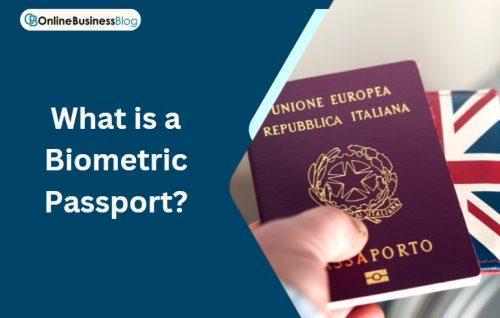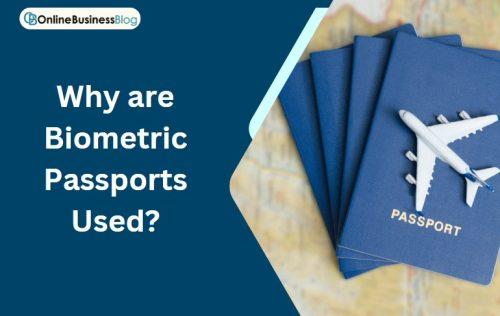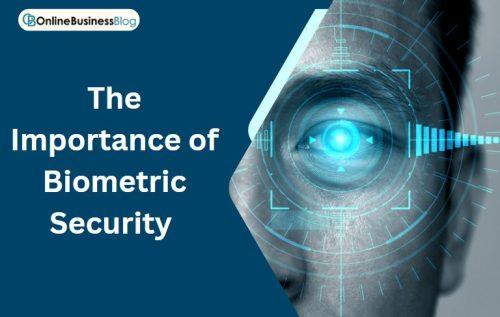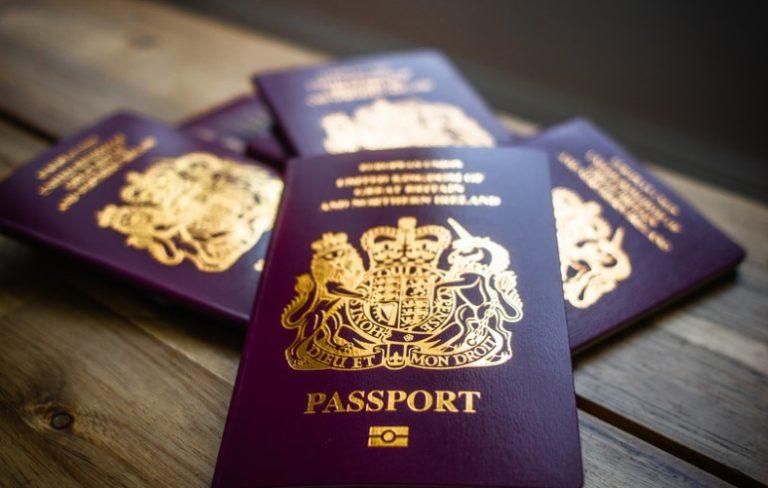Post Contents
Step into the future of passport technology with the biometric passport! Picture this: a sleek document that not only holds your personal information but also your unique fingerprints and photographs. It may sound like something straight out of a sci-fi movie, but in reality, it’s becoming increasingly common in today’s world. In this blog post, we’ll explore what exactly a biometric passport is, why it’s used, how to get one in the UK, and so much more. So buckle up and prepare to embark on an exciting journey into the realm of advanced security measures – because your next adventure starts with a simple swipe of your fingertips!
What is a Biometric Passport?

When it comes to travel documents, the biometric passport is a game-changer. It takes the traditional paper passport and adds an extra layer of cutting-edge technology. Embedded within its pages is a tiny microchip that holds a wealth of personal information – from your name and date of birth to your nationality and passport number.
But here’s where things get really interesting: the biometric passport goes beyond just storing basic details. It also houses something truly unique – your very own fingerprints! That’s right, with this advanced document, you can leave no room for any doubt about your identity.
Alongside your fingerprints, the chip also stores a high-resolution photograph of you. So when border control officers scan your passport at airports or other points of entry, they not only see your face but can instantly compare it with the stored image on file.
What does all this mean for you as a traveller? Well, first and foremost, increased security. With its embedded microchip containing both fingerprints and photographs, the biometric passport makes counterfeiting far more difficult than ever before.
So whether you’re embarking on an exotic adventure or simply exploring new horizons across borders – rest assured that having a biometric passport in hand means enhanced protection for you and peace of mind for authorities worldwide.
Why are Biometric Passports Used?

Biometric passports have become a vital component of modern travel, serving to enhance security measures and combat the rising threat of passport forgery and tampering. The incorporation of a microchip within these passports makes it significantly more challenging for individuals to counterfeit or alter their documents undetected.
The microchip stores important personal information, such as your name, date of birth, nationality, passport number, and most notably, your biometric data. This includes your unique fingerprints and an accurate photograph that can be used to verify your identity with precision.
By utilizing biometric technology in passports, governments around the world are able to establish a robust system that safeguards against identity theft and fraud. The use of fingerprints specifically ensures that only the authorized holder can access the benefits associated with their passport.
Furthermore, biometric passports contribute towards reducing wait times at border controls by enabling electronic scanners to quickly authenticate travellers’ identities. This automated process not only enhances efficiency but also provides an added layer of security in identifying potential threats or suspicious individuals.
With ever-evolving technologies aiding criminal activities such as counterfeiting passports becoming more sophisticated than ever before; adopting biometric passports is undoubtedly a critical step forward in bolstering global security efforts. These innovative features provide peace of mind for both travellers and authorities alike by deterring fraudulent activities while facilitating safe passage across international borders.
What Information is Stored on a Biometric Passport?
A biometric passport is not just an ordinary travel document. It carries a wealth of information that goes beyond the traditional paper passport. When you hold a biometric passport in your hands, it’s like holding your identity within its pages.
First and foremost, your personal information is stored on the microchip embedded in the passport. This includes details such as your name, date of birth, nationality, and passport number. Having this information readily available makes it easier for authorities to verify your identity quickly and efficiently.
But what sets a biometric passport apart from its predecessors is the inclusion of additional biometric data. Your unique physical characteristics are captured and stored on the microchip as well. A high-resolution photograph serves as a visual representation of who you are, allowing officials to match it with your appearance when you present yourself at immigration checkpoints.
Furthermore, your fingerprints are also stored digitally within the chip. These distinctive patterns provide an extra layer of security by making it extremely difficult for anyone to impersonate or tamper with your identity.
A biometric passport contains not only essential personal details but also captures key elements that define who you are physically – all aimed at enhancing security measures and protecting travellers worldwide without any compromise on convenience or efficiency
How Do I Get a Biometric Passport in the UK?

To get a biometric passport in the UK, you can apply online or at a passport office.
Online applications
To apply online, you will need to create an account on the Passport Office website. Once you have created an account, you can start your application. You will need to provide your personal information, a passport photograph, and your fingerprints. You will also need to pay the passport fee.
Paper applications
To apply by post, you will need to download and print the passport application form. You will also need to provide two passport photographs and a copy of your current passport (if you have one). You will also need to pay the passport fee.
Once you have completed your application, you will need to send it to the Passport Office. You can send your application by post or by courier.
Processing times
The processing time for passport applications varies depending on the time of year. In general, you can expect to receive your new passport within 10 weeks of applying. However, it is important to note that processing times can be longer during peak periods.
Additional information
You can apply for a biometric passport up to 9 months before your current passport expires. If you are applying for a passport for the first time, you will need to provide proof of your identity and nationality.
If you are unsure about anything related to applying for a biometric passport, you can contact the Passport Office for more information.
Benefits of Using a Biometric Passport
Biometric passports offer a range of benefits that make them a valuable tool for travellers. One major advantage is the improved security they provide. With their embedded microchips and biometric data, biometric passports are much harder to forge or alter compared to traditional paper passports. This heightened security helps protect against identity theft and unauthorized use.
Another benefit is the reduced wait times at borders. Biometric passports can be quickly and efficiently scanned by electronic systems, allowing for smoother immigration processes. This means less time spent in long queues, especially during peak travel periods.
Additionally, having a biometric passport can increase your access to countries around the world. Some nations now require visitors to have biometric passports as part of their entry requirements. By possessing this advanced form of identification, you can broaden your options when it comes to international travel destinations.
Utilizing a biometric passport offers improved security measures against counterfeiting, faster processing times at border control points, and increased access to various countries worldwide – all essential elements for modern-day travel convenience and peace of mind.
The Importance of Biometric Security

In today’s digital age, security is paramount, especially when it comes to something as important as passports. That’s where biometric security measures come into play. Biometric data, such as fingerprints and photographs, are unique to each individual and virtually impossible to replicate or forge.
By incorporating biometric technology into passports, the UK government has significantly enhanced the level of security for its citizens. The microchip embedded within a biometric passport contains encrypted information that can only be accessed with specific verification methods.
This advanced level of security helps prevent identity theft and fraudulent activities associated with traditional passports. It ensures that only the rightful owner can access their personal information and travel freely across borders. Additionally, border control officials can quickly verify an individual’s identity using electronic scanners that read the biometric data stored in their passport.
Biometrics not only increase security but also streamline processes at airports and other entry points. With electronic scanning systems in place, wait times at borders are reduced significantly compared to manual checks on traditional passports.
Furthermore, many countries have made it mandatory for visitors to possess a biometric passport for entry purposes. By adopting this advanced technology, the UK enables its citizens to enjoy increased access to these countries without facing any unnecessary hurdles or complications.
The importance of biometric security cannot be overstated when it comes to modern passports in the UK. It provides peace of mind for travellers while ensuring efficient management of immigration processes worldwide.
Biometric Passport Fees in the UK
Biometric passport fees in the UK vary depending on the applicant’s age. For adults, the fee is £85.50, while for children it is £53.50. These fees cover both the cost of the passport book and the biometric enrolment process.
If you are applying for a biometric passport outside of the UK, there may be an additional fee payable to the British Embassy or Consulate in that country. The exact amount will depend on where you are applying from.
Payment for your passport application can be made online, over the phone, or by post. If applying online, debit or credit cards are accepted forms of payment. However, if applying by phone or post, you also have the option to pay with a cheque.
There are certain exemptions to paying biometric passport fees in specific circumstances:
– Children under 5 years old
– Individuals with disabilities preventing them from providing fingerprints
– First-time applicants who cannot give their fingerprints due to living in a country without biometric enrolment availability
If you believe you qualify for an exemption, it is recommended to contact the Passport Office directly for further information.
Please note that fees set by the Passport Office can change at any time; therefore, it is essential to check their website regularly before submitting your application.
Biometric Passport vs. Traditional Passport

Biometric passports and traditional passports may look similar at first glance, but there are several key differences that set them apart. The main distinction lies in the embedded microchip found in biometric passports, which holds personal information such as your photograph and fingerprints. Traditional passports do not have this feature.
The inclusion of a microchip in biometric passports enhances security measures significantly compared to their traditional counterparts. This added layer of security makes it much more difficult to forge or alter a biometric passport, thus reducing the risk of identity theft and fraudulent activities.
Another advantage is the shorter wait times at borders for individuals with biometric passports. Electronic scanners can quickly read the data stored on the microchip, expediting the verification process and reducing queues at immigration checkpoints.
Additionally, more countries around the world accept biometric passports than traditional ones. Therefore, having a biometric passport grants you increased access to various destinations without facing any restrictions related to passport type.
However, it’s important to note that obtaining a biometric passport comes with an additional cost when compared to traditional passports. The advanced technology involved in producing these secure documents contributes to their higher price tag.
While both types of passports serve the same purpose of facilitating international travel, biometric passports offer enhanced security features and greater convenience at border crossings. Although they come with a higher cost, many find that these benefits outweigh any drawbacks associated with their use.
Renewing or Replacing Your Biometric Passport
Renewing or replacing your biometric passport in the UK is a straightforward process that can be done either online or by post. For online applications, you’ll need to create an account on the Passport Office website and provide your personal information, passport photograph, and fingerprints. Don’t forget to pay the passport fee as well!
If you prefer a paper application, download and print the passport application form. Along with the completed form, include two passport photographs and a copy of your current passport if you have one. Just like with online applications, make sure to pay the required fee.
Once your application is complete, it’s time to send it off to the Passport Office. You can choose between sending it by post or courier service.
Now comes the waiting game. Processing times for passports vary depending on the time of year but generally expect to receive your new document within 10 weeks after applying. Keep in mind that processing times may be longer during peak periods.
When renewing your passport, remember that you can do so up to 9 months before its expiration date. Simply provide your old passport along with a new photograph and payment of fees.
In case your existing biometric passport gets lost, stolen or damaged – don’t worry! You have options for replacement too. Fill out a new application form while including another recent photograph and paying applicable fees.
With these guidelines in place for renewing or replacing your biometric passport in the UK, getting ready for international travel becomes much easier!
How Do I Know if My Passport is Biometric?

There are a few ways to tell if your passport is biometric:
- Look at the cover. If your passport has a small, gold camera logo at the bottom, then it’s biometric.
- Check the inside of the passport. If the inside of your passport has a page with a microchip embedded in it, then your passport is biometric.
- Try to scan your passport. If you have a passport scanner, you can try to scan your passport. If the scanner is able to read your passport, then your passport is biometric.
If you are still unsure whether or not your passport is biometric, you can contact the passport office for more information.
Conclusion
In today’s world, where security is of utmost importance, biometric passports have become a significant advancement in passport technology. With an embedded microchip containing personal information, fingerprints, and a photograph, these passports offer enhanced security measures to prevent counterfeiting.
The use of biometric data not only makes it more difficult for individuals to forge or alter their passports but also allows authorities to verify the identity of the passport holder with ease. This added layer of security not only protects individuals from identity theft but also helps in maintaining international border control.
Moreover, biometric passports offer practical benefits as well. The electronic scanners at borders can read these passports quickly and accurately, reducing wait times for travellers. Additionally, many countries now require visitors to have biometric passports for increased access.
It’s important to note that obtaining a biometric passport in the UK involves applying online or at a passport office and providing necessary personal information along with fingerprints and a passport photograph. While there are fees associated with getting a biometric passport, certain exemptions apply depending on age or disability.
Renewing or replacing your biometric passport can be done through online applications or by post. However, processing times may vary based on demand.
In conclusion, investing in a biometric passport is an investment in your own safety and convenience while travelling internationally. So if you’re planning your next adventure abroad and need to update your travel documents, consider applying for a modernized biometric passport – because when it comes to protecting yourself and ensuring smoother travels across borders; why settle for anything less?


